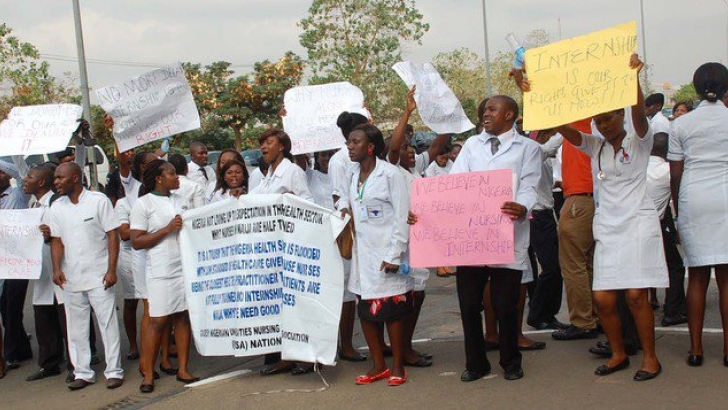By Amir Abdulazeez
Whenever and wherever ‘corruption’ is mentioned in Nigeria, what dominates and often overwhelms the thinking of many citizens is the theft of public funds by those at the helm of the nation’s affairs. Some consciously and subconsciously think corruption only involves politicians who are mostly accused of stealing public funds while in office, others think it’s the only corruption that really matters. We need to have a critically broader and in-depth look at the larger Nigerian society, perhaps we may find out that, there is much more to corruption than just stealing of public funds.
When immediate past president, Dr. Goodluck Jonathan was reported to have ‘gaffed’ that ‘ordinary stealing, we call it corruption’, little did we bother to digest his words beyond the goat and yam theory. May be it wasn’t a gaffe, he probably meant what he said. There is the possibility that he was trying to explain that there is more to corruption in Nigeria than the stealing of public funds. However, his statement wasn’t given any chance as whatever he said then was often ridiculed, misinterpreted or not even given any chance for introspection at all. This is what happens to you when you govern so woefully that you completely lose public trust.
It may be true that in the last 35 years or so, the theft and mismanagement of public funds by Nigerian leaders and government officials has been the single biggest and most critical corruption that has negatively affected nation-building and retarded national prosperity. This might be the primary reason why most Nigerians not only decided to be corrupt themselves but also see public funds theft as the only corruption while others see other corrupt practices as either not significant, less relevant or virtually non-existent.
If we weigh public funds theft against the totality of all other mostly overlooked corrupt practices going on in our country, few will argue against the other corrupt practices far outweighing the theft of public funds, if not economically but by the level moral decadence they have inflicted on our society.
Advertisement
While our attention have been fixated on theft of public funds by politicians and their agents, our secondary schools across the country are gradually turning into exam malpractice centers; our universities are turning into prostitution hallmarks; quackery has eaten deep into almost every profession; our police force has turned into a crime-perpetrating and encouraging agency; our cyberspace is been hijacked by fraudsters; our entertainment industry is being milked dry by pirates; our researches are have been overwhelmed by plagiarism and lack of content; our civil service is an embodiment of nepotism; our political parties are turned into financial parties; our judiciary is fast becoming the last misery of the common man and the last hope of the highest bidder; our telecommunications networks are becoming agents of customer exploitation; our private sector is turning into a sector that help politicians disguise their corruption; our contractors becoming partners in crime with those in power; our media becoming agents of paid propaganda; etc. The list is endless. Corruption has eaten deep into every nook and cranny of our social, economic and political life.
How much value does the Nigerian education now has? How many candidates actually pass the West African Examination Council (WAEC) and National Examination Council (NECO) mandatory end of secondary school examinations based on merit without exam malpractice? Some government secondary schools have been earmarked as SSCE must-pass centers. Many examination bodies’ staffs are being compromised as exam malpractice take place with their active connivance. The case is worse in private schools as they mostly represent an institutionalized version of exam malpractice centers. Many people including those in the government’s education sector are fully aware that no proper Senior Secondary Certificate Examinations (SSCE) takes place in a substantial number of our private secondary schools nationwide. In some private schools, candidates are charged SSCE registration fees according to the number of credits or distinctions they want to have across different subjects. This does not stop with the regular May/June exams; even the much more independent November/December GCE is being compromised in many of the examination centers. Nowadays, even the Joint Admission Matriculation Board (JAMB) exam is not as credible as it used to be.
How credible are our tertiary institutions as sex-for-grades scandals continue to rock our universities and other higher institutions of learning. Lecturers are busy turning female students into prostitutes rather than mentoring them to become future academic role models. How many of our private universities are really up to standard as we continue to issue licenses for new ones? All these are happening as we look askance. How valuable is education in Nigeria while it is highly unlikely to fetch you a job without third party intervention? How much worse and wicked can corruption become?
Advertisement
How many ordinary citizens now rely on the police force and judiciary for justice? Policemen who supposed to discourage and prevent crime are the same people who seduce people into committing such and then later ‘force’ them to bribe their way out. Any corruption worse than this? How affordable is justice in Nigeria? Is the Nigerian judiciary for the common man or is it for those who can afford the services of a lawyer and in some cases the price of the presiding judge?
The Nigerian entertainment industry which has been one of the most promising industries in the last 20 years and which at a time looked set to rule the world is now being grounded by piracy. Entrepreneurs in the industry look helpless as faceless pirates fraudulently smile to the bank with the help of many corrupt-minded Nigerian public. Why would Nigerians continue to buy pirated products and still expect the industry they so much enjoy its services to survive and even grow? Are we also waiting for the government to come and solve this? Pirates are mostly faceless; government cannot significantly stop them no matter how much they crack down on them, only the public can by refusing to buy their products. In another development, the continuous activities of fraudsters on the internet have continued to threaten the smooth running of our business online.
Many professionals in Nigeria, no longer have a problem with violating the ethics of their profession in order to make money. Consultant engineers connive with contractors to short-change their clients and later you hear a building avoidably collapsing after few years of construction, killing many innocent people.
Our telecommunication companies seem to be no longer driven by consumer satisfaction but by making money out of him at all cost and in some cases by deceit. As if they have not had enough by exchanging their poor services with consumers hard earned money, they still go ahead to rob him by seducing him into accepting some of their packages which they have done well to make some of their terms and conditions ambiguous and anonymous; upon accepting the package, he ends up finding out that he has been cheated.
Advertisement
In the 2015 general elections, many people who contested and won primary elections under their political parties had their candidacies sold to their co-contestants or even to those who never joined the race in the first place. Political parties’ national secretariats became venues where candidacies are traded and sold to the highest bidders. This is the main reason why we had many scenarios where two or more people thought they were their party nominees and by extension the actual winners of a particular election and ended up jostling to receive one INEC certificate meant for only the winner.
If we continue, we will end up attempting to discuss all the corruption in Nigeria which is not possible. This is the corruption government alone cannot tackle, we have to join hands. Government can only help to some extent, but we are the ones who must make up our minds that we are tired of living a corrupt life. We must be tired of letting in corruption into every part of the system. The problem with solely relying on government to fight corruption is that even the government’s anti-corruption mechanism is not immune to corruption. For instance, can we bet against bribery and financial inducements influencing EFCC and ICPC’s investigations or a court’s activities?
It is understandable that the consequences of public theft by corrupt politicians have a ripple effect on the general level of corruption in the society, but it must not be seen to be responsible for all the corruption taking place in the country. By doing this, corrupt people in our society will continue to have a free day as we look only up to politicians to search for corruption.
Let us support the government to fight, arrest and prosecute public thieves; let us ensure that what is stolen is being returned into the public treasury, but let us rise up and fight moral and social corruption in our society. Let us decide that we no longer want to pass examinations through malpractice; let us decide not to buy pirated products; let us resist quackery in every profession and insist on quality services; let us stop trying to bribe policemen at the slightest opportunity; let us understand the laws of our land and fight for our rights against anyone who denies us; let us stop corruption from becoming our way of life.
Advertisement
Advertisement
Views expressed by contributors are strictly personal and not of TheCable.
Add a comment

